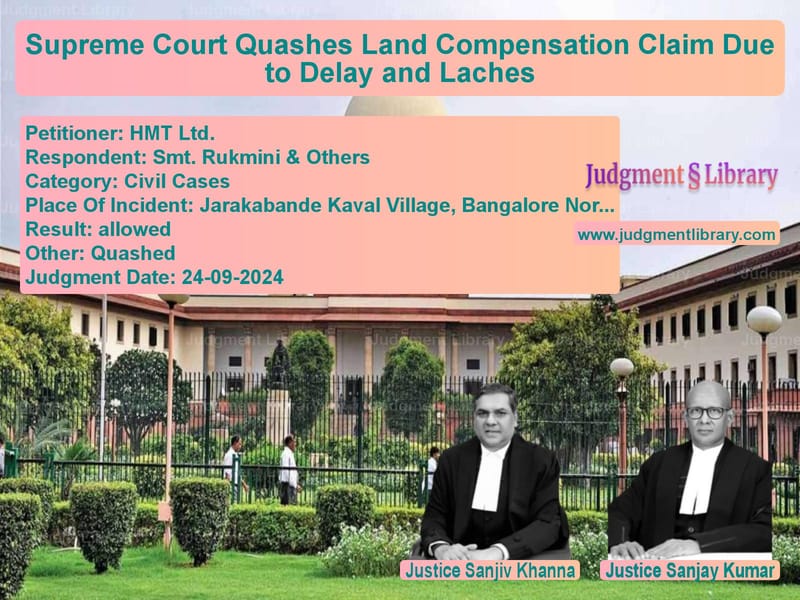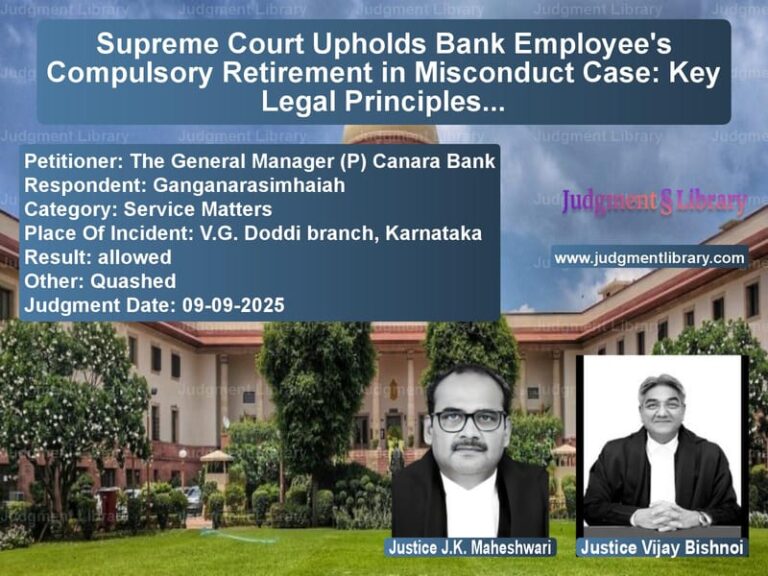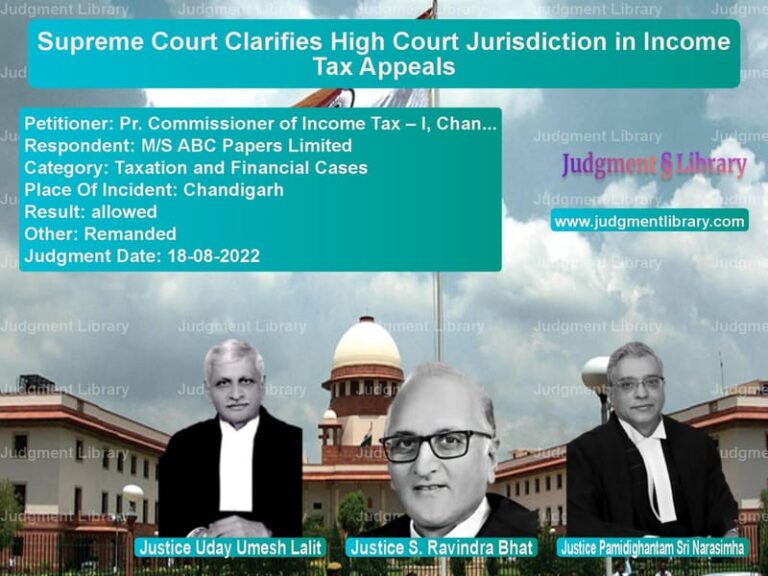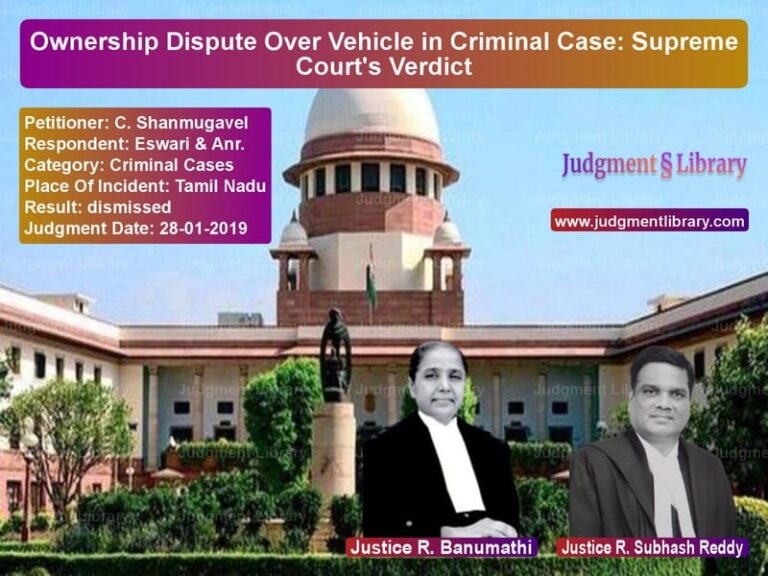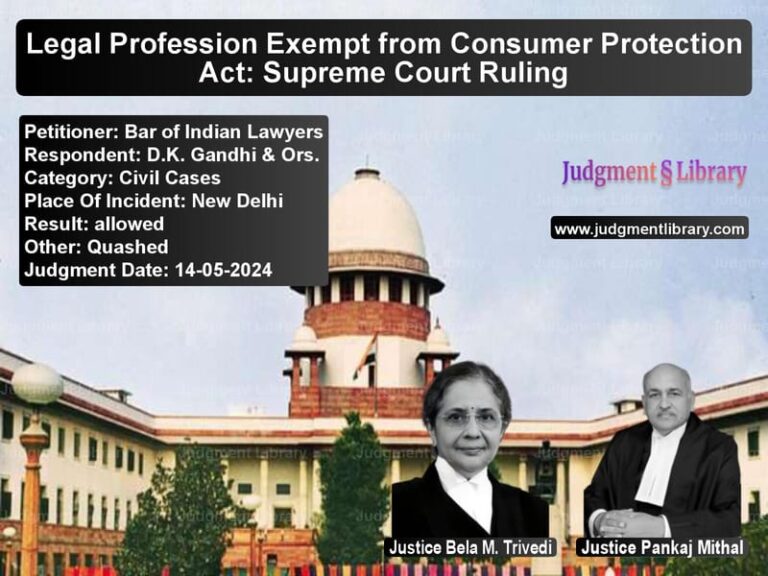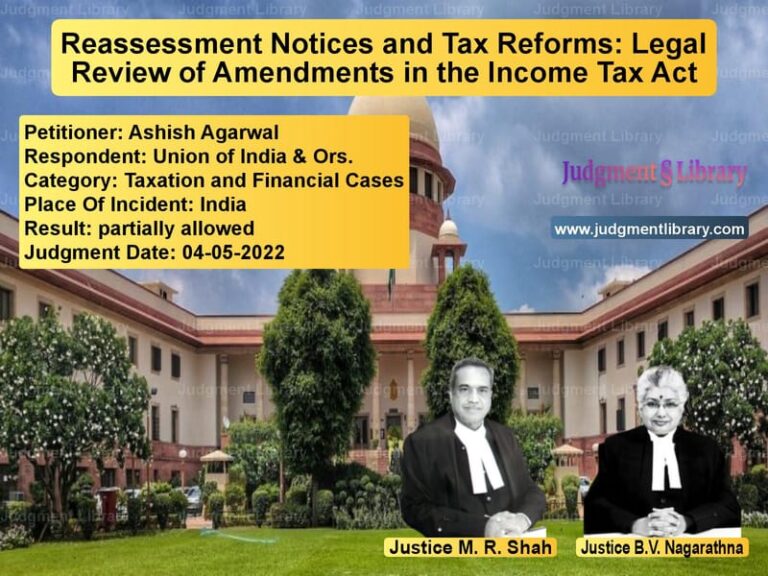Supreme Court Quashes Land Compensation Claim Due to Delay and Laches
The case of HMT Ltd. vs. Smt. Rukmini & Others revolved around a prolonged land compensation dispute concerning government-acquired land in Jarakabande Kaval Village, Bangalore North Taluk. The Supreme Court, in its judgment dated September 24, 2024, overturned the Karnataka High Court’s ruling that had granted compensation and rental claims to the petitioners.
The case underscores legal principles regarding land acquisition, compensation, and the doctrine of delay and laches. The Court held that claims raised decades after the acquisition process are not maintainable, as they disrupt established property rights and burden the judicial system.
Background of the Case
The land in question, originally owned by Putta Narasamma, was requisitioned by the Ministry of Defence in 1941 under the Requisition and Acquisition of Immovable Property Act, 1952. The legal dispute arose over Ac. 4-21½ Guntas of land in Survey Nos. 21 and 22 of the village.
Read also: https://judgmentlibrary.com/supreme-court-upholds-amendment-of-pleadings-in-property-dispute-case/
The petitioners, heirs of Putta Narasamma, claimed that they were entitled to:
- Rental compensation for the land from 1973 onwards.
- Delivery of the unacquired portion of their land.
- Payment of compensation based on the current guidance value.
The High Court had ruled in favor of the petitioners, directing HMT Ltd. and the Union of India to either return the land or compensate the petitioners monetarily.
Legal Proceedings
Initial Dismissal by the Karnataka High Court
- The writ petition, W.P. No. 16553 of 2006, was initially dismissed on May 24, 2010.
- The High Court held that 46 years had elapsed since the acquisition, making the claims untenable.
- It ruled that disputed land ownership issues could not be adjudicated in a writ petition.
Reversal by the Karnataka High Court’s Division Bench
- On September 5, 2019, the Division Bench reversed the single-judge ruling.
- It ordered HMT Ltd. and the Union of India to either:
- Vacate and return the land.
- Pay compensation based on the current market value.
- Provide rental compensation from 1973 onwards with 6% interest.
- The Bench justified its ruling as an equitable remedy.
Appeal Before the Supreme Court
The appellants, HMT Ltd. and the Union of India, challenged the High Court’s ruling on the following grounds:
- The writ petition was delayed by over 46 years, making the claim legally untenable.
- The petitioners deliberately suppressed key facts regarding the sale of portions of the land.
- The land was used for public purposes and could not be returned.
- Granting compensation after such a long period would set a dangerous precedent.
Supreme Court’s Observations
The Supreme Court, comprising Justices Sanjiv Khanna and Sanjay Kumar, ruled in favor of the appellants.
1. Delay and Laches Barred the Claim
- The Court held that the petitioners had slept over their rights for decades.
- It cited Syed Maqbool Ali vs. State of Uttar Pradesh (2011), stating that courts must reject stale claims to maintain judicial efficiency.
- The judgment emphasized:
“A constitutional court should be convinced that delay is justified before granting discretionary relief.”
2. Suppression of Facts
- The Court found that the petitioners failed to disclose that portions of the land were already sold to third parties.
- It stated:
“Deliberate suppression of material facts is an abuse of judicial process and cannot be tolerated.”
3. Public Interest Considerations
- The land was used for public purposes, including defense installations and industrial development.
- The Court ruled that allowing such claims would jeopardize future infrastructure projects.
- It emphasized that government-acquired lands cannot be claimed back after decades.
4. Equitable Relief Cannot Override Established Laws
- The High Court’s reliance on equity was erroneous.
- The Court cited State of Maharashtra vs. Digambar (1995), stating that equity cannot override legal principles.
- It ruled:
“Judicial discretion must be exercised within the boundaries of law.”
Final Judgment
The Supreme Court ruled:
- The appeal was allowed, and the Karnataka High Court’s decision was set aside.
- The original writ petition filed by the respondents was dismissed in its entirety.
- No punitive costs were imposed, but the petitioners were warned against frivolous litigation.
Implications of the Judgment
This ruling has significant legal implications:
- Reinforcement of Delay and Laches Doctrine: Prevents stale claims from disrupting government projects.
- Protection of Public Property: Ensures that lands acquired for defense and industrial use remain undisturbed.
- Strict Scrutiny of Land Compensation Claims: Courts will closely examine delays in filing claims.
The Supreme Court’s decision serves as a strong precedent against claims made decades after land acquisition, ensuring judicial efficiency and stability in land ownership.
Petitioner Name: HMT Ltd..Respondent Name: Smt. Rukmini & Others.Judgment By: Justice Sanjiv Khanna, Justice Sanjay Kumar.Place Of Incident: Jarakabande Kaval Village, Bangalore North Taluk.Judgment Date: 24-09-2024.
Don’t miss out on the full details! Download the complete judgment in PDF format below and gain valuable insights instantly!
Download Judgment: hmt-ltd.-vs-smt.-rukmini-&-other-supreme-court-of-india-judgment-dated-24-09-2024.pdf
Directly Download Judgment: Directly download this Judgment
See all petitions in Property Disputes
See all petitions in Public Interest Litigation
See all petitions in Landlord-Tenant Disputes
See all petitions in Judgment by Sanjiv Khanna
See all petitions in Judgment by Sanjay Kumar
See all petitions in allowed
See all petitions in Quashed
See all petitions in supreme court of India judgments September 2024
See all petitions in 2024 judgments
See all posts in Civil Cases Category
See all allowed petitions in Civil Cases Category
See all Dismissed petitions in Civil Cases Category
See all partially allowed petitions in Civil Cases Category

